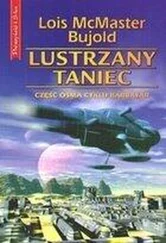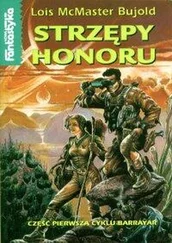Dag turned in his saddle to look over his shoulder. Half a mile below the glittering shoals on this side, where the river again curved out of sight, was the farmer hamlet of Pearl Bend, which also boasted a wharf boat serving the crossing, as it made sense to offload heavy cargo before hauling a boat up over the Riffle, or wait to load on till after successfully negotiating the hazard coming down. The Glassforge men would take the bulk of their goods there. Pearl Bend, too, boasted more roofs than Dag remembered; practically a village, now.
Dag turned back to find the cautious glass-men pulling their wagons to a halt at a wide space in the road, huddling toward the hillside. A troop of riders was coming up the slope, double file—a Lakewalker patrol, outbound from Pearl Riffle Camp, likely. A dozen and some men, maybe half that many women, a normal complement. Dag drew Copperhead in behind Tanner’s wagon and squinted down the track. He fought an impulse to open his crippled groundsense wide, closing it down instead. He could look with his eyes well enough.
Outbound for certain, Dag decided, as first patrollers drew level with the wagons and fell into single file to pass. They appeared far too rested and tidy to be anything else. He suppressed a company captain’s inventory of the condition of every horse, rider, and weapon approaching. Not his job, anymore.
The patrol leader, who had barely glanced at the wagons, looked up as he spotted Dag and urged his mount forward. Dag opened his groundsense just enough to keep Copperhead polite as the strange horse loomed near.
“Courier?” demanded the patrol leader, a spare, middle-aged fellow with a shrewd eye.
Because why else would a Lakewalker be riding alone, and if the news Dag bore was bad, perhaps this patrol was about to acquire a more urgent task than their routine search patterns. His mind would not connect Dag, in Lakewalker gear on what was obviously a patrol horse, with the party of farmers that his patrol was rounding.
Dag touched his hand to his temple in a courteous salute, but said, “No, sir. Just travelin’ through.”
The patrol leader’s shoulders eased in relief. “Any news from the north?”
He meant patrol news, Lakewalker news. “All was quiet when I passed through Glassforge, three days back.”
The leader nodded. He looked as if he’d like to pause for fuller gossip, but the last rider cleared the obstructing wagons and kicked her horse into a trot to take up her place in the re-forming double file. He contented himself with a return salute and a “Travel safely, then.”
“You, too. Good hunting.”
An acknowledging grimace, and he trotted after the others.
Dag took back his place as Fawn’s outrider as the two wagons creaked into motion again. Fawn twisted around in her seat to watch the departing patrol, turned back, and glanced across at Dag. Concern shone in her big brown eyes, though for what cause Dag was uncertain.
Tanner, too, cast a curious look over his shoulder. “So, all those Lakewalkers are going off to hunt for blight bogles, are they? With their, their ground-senses?”
“Yes,” said Dag. “Pearl Riffle Camp doesn’t cover as big a territory as Hickory Lake—that’s my, was my, home camp. Hickory has eight, nine thousand folks, the biggest camp in Oleana. Doubt Pearl Riffle has eight or nine hundred. They can field maybe two or three patrols, barely a company. But their more important task is right here, keeping the ferry crossing open in case of need. If the Glassforge malice had gotten out of hand—more out of hand—we might have called on Lakewalker camps from south of the Grace to help out. Or the other way around, if they ran into trouble down there.”
“The way Hickory Lake sent Dag’s company west to fight the malice that came up in Raintree, couple of months back,” put in Fawn, for Tanner’s sake. And, at Tanner’s next question, went on to give him an accurate summary of the summer’s campaign, if sketched in broad strokes, and all in terms a farmer might readily grasp, because, after all, Fawn was one. Which drew braver questions from the teamster in turn. Dag listened in grateful silence, backing her with an occasional nod. This fruitful exchange lasted till the wagons reached the bottom of the long slope and turned across the narrow floodplain toward the river.
When they reached the crossroads, Dag said, “Fawn, do you think you’d be all right staying with Whit for a little? I’d like to pay a visit.” He jerked his head upstream.
“Sure. This is the camp where Saun and Reela stayed, right?”
The two were fellow patrollers injured in the Glassforge fight, sent down here as the closest place to convalesce. Saun had been Dag’s own partner; Fawn had made friends of a sort with Reela, laid up in the hotel afterwards with a broken leg. “Yes,” Dag answered.
“Do you have friends here? Or k—” She cut short the last word: kin.
“Well, I’m not sure,” he said, passing over her little stammer. “It’s been a while since I was down this way. Thought I’d go check.” Which was not exactly the reason for his detour, but he was reluctant to discuss the real one in front of Tanner. Especially as Dag himself was doubtful of the result. “I’ll find you two after my errand. Might be a while. Stay by Whit, right?”
“Dag, I don’t need my brother to guard me every minute.”
“Who said it was you I thought needs a keeper?”
She dimpled, taking this in; he cast her a return wink, possibly more cheerful-looking than he felt. The wagons turned right onto the downstream road toward Pearl Bend. Dag wheeled Copperhead around and trotted in the opposite direction.
Across a shallow run and over a rise, he came to the camp’s perimeter and let his groundsense ease open just a hair, to present himself to the gate guard, if any. He felt an inquiring double-flick in return, and raised his eyes to spot not one but a pair of Lakewalkers lingering on a couple of stumps flanking the road. An older man was whittling pegs; a morning’s worth lay piled haphazardly at his feet, and Dag’s nostrils flared with the pleasant tang of new shavings. A young woman worked on weaving willow-withy baskets, but a bow and quiver leaned against a rock within easy reach. Patrollers both, on light camp duty.
Dag drew up Copperhead and nodded. “How de’.”
The man stood. “Good day to you”—a slight hesitation, as he looked Dag up and down—“patroller.” An anxious look crossed his face. “Courier, are you?”
“No, sir, just stopping by. I was hoping you could tell me where to find your camp captain, and who’s holding that post these days.”
The young woman frowned at his hook, wrapped with Copperhead’s reins, and he lowered it a trifle. The man directed Dag to look for Amma Osprey in the third tent to the left past the split oak tree, and Dag, not lingering to get tangled in talk, pressed Copperhead on. A last curious ground-flick touched him. Pass, friend.
Both ease and anxiety knotted in him as he rode by the familiar domestic sights of a Lakewalker camp. Tents peeked through trees, the traditional log structures with hide awnings rolled up on their fourth, open sides, mostly looking southwest to the river. Stands of fruit trees, beehives, homely washing on lines. Smoke rising from chimneys, the smells of cooking and preserving. From a distance, a less pleasant whiff of tanning hides. Half a dozen black-and-white speckled chickens squawked and fluttered across Copperhead’s path, and the horse tossed his head and snorted.
Downslope near the shore, a couple of men were building a good-sized narrow boat on a rack, hammering in pegs. Twenty-five feet long, double-prowed, broad in the middle, clearly meant for the river trade—its boards looked mill-sawn. A few of the newer tent-cabins, too, were built of such planks; the farmers at Pearl Bend or Possum Landing must have put in a sawmill on one of the feeder creeks.
Читать дальше









